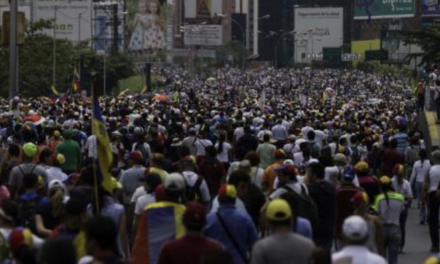The Inter-American Dialogue’s daily Latin America Advisor has published a Q&A on the significance of the recent release of Leopoldo Lopez to house arrest, with a roundup of opinions from a number of Venezuela analysts.
WOLA Senior Fellow David Smilde’s contribution is below. See other contributions by Luis Vicente León, Jennifer McCoy, Alejandro Velasco, and Eva Golinger here.
Q: Venezuela’s government on July 8 released opposition leader Leopoldo López from prison and transferred him to house arrest. The government said he was released due to health reasons, and the Supreme Court said his release was also due to “serious signs of irregularities” in the handling of his case. Was the decision to release López indeed motivated by concern for his well-being, or did the government have other motives for doing so? How will López’s release affect the opposition’s strategy in confronting the administration of President Nicolás Maduro, if at all? To what extent will López now have more direct infl uence over the anti-government movement in the country?
A (from David Smilde, WOLA senior fellow and professor of sociology at Tulane University):
“Sending Leopoldo López to home detention does not appear to have been part of any type of negotiation, other than José Luis Rodríguez Zapatero’s request for a goodwill gesture. As such, it allowed the government to relieve some international pressure by apparently making such a gesture. The way the government framed the move—as a ruling by the Supreme Justice Tribunal (TSJ) for humanitarian reasons and due to irregularities in the case—also helped the government in its battle against Attorney General Luisa Ortega. Her break with the government has made her a hero among the opposition. This move allowed the government to highlight the uncomfortable fact that it was Ortega’s office that prosecuted López. It also allowed government officials to portray themselves as obedient to the orders of an independent TSJ that does not always rule their way. That would give them some grounding to suggest to the opposition that it should not complain if and when the TSJ dismisses Ortega. Early suggestions by some of us that the López move would cause divisions within the opposition have not been borne out. López is at home but is under a gag order that limits what he can say and therefore what influence he can have. In fact, the López release provided a rare victory for the opposition and as such, an important boost a week before its effort to call a plebiscite. The plebiscite itself was much more important than the López release. Getting seven million people to turn out for a do-it-yourself election was an impressive feat and gave the opposition some momentum and international attention in its struggle against Nicolás Maduro’s authoritarian project.”




